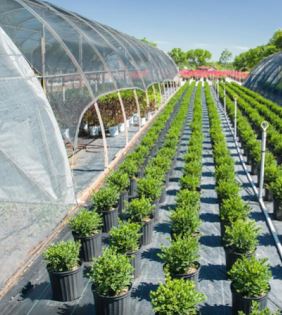From Hogs to Horticulture
By Carol Lea Spence, UK College of Agriculture, Food, and Environment Magazine
On the foundation of an old gestation barn, boxwood thrives. On the former nursery site, a new propagation greenhouse stands, its tables made from grates recovered from the farrowing house. The former finishing barn is now used for storage.
The hog farm that Keith Veech once worked with his father may be gone, but its infrastructure remains to support a growing enterprise–Keith and Shawn Veech's Nelson County greenhouse business, V&V Wholesale Nursery.
When his father retired in the mid-90s, Veech tried to keep the business going, but the bottom dropped out of the hog market. The Veechs hung on for about two years, but finally decided to get rid of the hogs and try something else on the property where Keith had grown up.
He had been working for AT&T and also helping out at a local nursery on the side. With the knowledge he'd picked up there, plus a small grant from the Agricultural Development Fund Phase I tobacco money, he and Shawn were able to make the switch to the green industry, albeit part time at first.
"It was a long, hard road," he said. "People will say it takes five years to get a business established. Well, that's a short period, I think."
Robbie Smith and Keith Veech discuss Veech's new propagation house, buildt on the bones of the old hog nursery barn.
The Veechs found help along that road, though, from Nelson County horticulture extension agent Robbie Smith, as well as a team of horticulture extension specialists from the College of Agriculture, Food, and Environment. Smith came to Cooperative Extension from the nursery business, so he had plenty of experience to back to his advice, aside from the access he provided to the college's specialists.
"I began working with them on the conversion," Smith said, talking about his more than 16-year working relationship with the Veechs. "Everything from fertilization, to plant selection, those kinds of things. We worked through some nutrition issues, and it really has paid off. He's a very good grower. Anything that comes up that he doesn't know the answer to, he knows he can give us a holler."
Robert McNiel, now emeritus horticulture extension professor, visited the property back around 2001, when Veech was thinking about putting a greenhouse on the site of the gestation barn. The three men decided the site was probably best used for outdoor nursery space. The low walls serve to keep the plants from blowing over, and it has air flow through it, which Smith said is the nature of hog barns.
Water management is a big issue in the greenhouse business. Both drainage and fertility issues have to be taken into consideration. The old gestation barn's bones work well for that, Smith said.
"Anything that comes up that he doesn't know the answer to, he knows he can give us a holler," said UK horticulture extension agent Robbie Smith, shown here with Keith Veech.
"The houses were set up, because in the hog business, the manure and everything naturally flows to the center to the drain. That's the way it still is now that it's nursery space, so you're not standing in water, and it flows right to the middle, then back out to recycle it in the pond."
In the new propagation house, which uses the bones of the nursery barn, the concrete floor Veech's father poured in 1979 is also designed to funnel water into a deep trough that serves as a drainage system, though here the water is city water. Smith said being able to keep the floors dry that way pays dividends in safety, because algae can build up on a wet concrete floor and cause a serious slippage problem.
McNiel had some further advice, telling Veech to fill up the floor trough with water to keep the humidity up in the greenhouse over the winter. This would also serve as a heat sink, Smith explained, with the water capturing the day's heat and releasing it during the night.
It's been 17 years since Veech started converting his hog barns into a plant nursery. V&V is strictly wholesale, concentrating mostly on woody shrubs, such as boxwood, arbor vitae, and burning bush, though Shawn Veech said she "piddles" with flowering herbaceous plants.
Robbie Smith, Keith Veech, andShawn Veech examine the roses.
Up until now, they've been buying their inventory in trays, flats, plugs, and up to gallon-sized pots for customers in Lexington, Louisville, Indiana, and Elizabeth. Now they're venturing into growing their own from cuttings, which will reduce the freight they have to pay to ship young boxwoods from Oregon.
But the new venture will take three years, and Veech said it is a gamble.
"You tell me what's hot and what's not," he said. "In three years from now, they might be going to something different."
But with the backing of Smith and the UK nursery crops extension team, it's a gamble the Veeches feel safe in taking.




